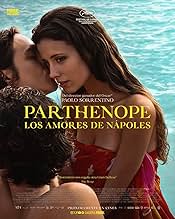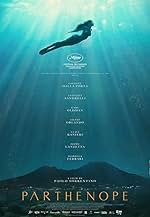Parthenope è un'incantevole giovane donna nata dalle acque che seduce ogni uomo che incontra, persino il fratello Raimondo, suo primo e indimenticabile amore. Parthenope è anche la sirena al... Leggi tuttoParthenope è un'incantevole giovane donna nata dalle acque che seduce ogni uomo che incontra, persino il fratello Raimondo, suo primo e indimenticabile amore. Parthenope è anche la sirena al centro del mito fondante della città di Napoli.Parthenope è un'incantevole giovane donna nata dalle acque che seduce ogni uomo che incontra, persino il fratello Raimondo, suo primo e indimenticabile amore. Parthenope è anche la sirena al centro del mito fondante della città di Napoli.
- Regia
- Sceneggiatura
- Star
- Premi
- 7 vittorie e 25 candidature totali
- Raimondo 10 anni
- (as Antonino Annina)
- Vecchia megera
- (as Mariarosaria Bozzon)
Riepilogo
Recensioni in evidenza
The overall problem...There is no plot, it's more a series of separate scenes on narcissism, or rather that's how they come across. I think Sorrentino wanted to create something profound but the result feels contrived and sad.
And then there's the anticlimactic ending - a sudden flash forward 50 years to an oddly empty/vacant character that is Parthenope in her 70s. What? Why?
- Eça de Queirós, The Illustrious House of Ramires, mutatis mutandis.
"The most beautiful gift is not the most expensive; it is the most fragile." Marques Rebelo, O Trapicheiro.
As the lights of the nineteenth century faded, Eça de Queirós-the great Eça-painted, through the face of Gonçalo Mendes Ramires, a symbolic portrait of Portugal that, as any good symbol does, contained everything, even when it sometimes seemed to contain nothing at all. Last year, Paolo Sorrentino, the great artist of contemporary cinema, painted with the face and body of Parthenope the symbolic portrait of Naples: yet another of his masterpieces, unveiling a city and a woman that, in the blink of an eye, are one in the lyrical conception of poet Sorrentino. Naples, or Parthenope- a name that evokes the mythological siren whose body is said to have given birth to the city-is not merely a backdrop, but a pulsating character. And Parthenope, the protagonist (portrayed with an ethereal melancholy), is its incarnation: born in the waters of the Mediterranean, like Venus, like Naples, she carries within her the contradiction of the sublime and the grotesque, of desire and death.
Sorrentino, heir to a Fellini-esque sensitivity for both beauty and the bizarre, does not fear excess. In scenes such as the party in Capri-where beautiful faces and bodies dissolved under golden lights-Parthenope, in her melancholy, asks her millionaire admirer: "Lei non pensa che il desiderio sia un mistero e il sesso il suo funerale?" [don't you think that desire is a mystery and sex its funeral]. The phrase echoes like an epitaph, laid bare to reveal the fragility and preciousness of desire and youth: desire as an unfathomable mystery, and sex as the funeral ritual of something that will never be consummated. It is in this interplay of opposites that the narrative unfolds, between the sculptural beauty of Naples' landscapes and the harshness of its forgotten alleys, where the protagonist walks with Roberto, an ambiguous character who unveils to her the other side of the city-a Naples both raw and poetic, where the contrast between the opulent luxury of grand houses and the simplicity of neglected corners becomes a metaphor for the city's inherent duality. Every step, every exchanged glance, carries the tension between the ephemeral and the eternal, between the urgent and the trivial. There, in the interplay of shadow and light, "the irrelevant merges with the decisive," as if chance itself became the silent arbiter of destinies. But is there any sense in speaking of chance? In song, Riccardo Cocciante tells us otherwise-everything was already foreseen.
"Beauty is like war: it opens doors," declares the alcoholic writer John Cheever (portrayed by Gary Oldman) in his brief, ghostly appearance. Drunkenly, he murmurs about the "scent of dead loves," a fragrance he claims to detect in his hotel room, surrounded by bottles of alcohol. So many dead loves in the city, in Parthenope's life. Here, her beauty is a weapon-a weapon that invariably wounds those who wield it: capable of granting access to privileged worlds, yet also imprisoning one in gilded cages. But Parthenope is a woman-city that "sfugge sempre": she flees, escapes, refuses to be deciphered, and always has a retort ready to disarm her interlocutors. What mysteries lie hidden within her?
The narrative delves into a universe where every image is meticulously sculpted to reveal the mysteries of existence. Amid this tapestry of contrasts stands Cardinal Tesorone, with his imposing and perverse figure, his grotesque nature and skepticism-a link in a Neapolitan religiosity divided between the sacred and the profane. His discourse, laden with solemnity and irony, resonates in the scene where, clad only in the adornments of San Gennaro's treasure, he attempts to seduce the city of Parthenope-or perhaps merely the delectable Parthenope herself-with the lubricity of a faun and the cynicism of an old man. Il tempo che scorre insieme al dolore.
In every dialogue, in every exchanged glance, the question echoes: is it possible that by trying to master desire, love ultimately imprisons its own freedom? And in this eternal ebb and flow between wanting and being, the protagonist remains undefinable, always escaping, constantly reinventing herself-as if the very city of Naples refused to be confined by labels or predetermined destinies.
In the twilight of her existence-be it amidst the effervescence of a Capri celebration or in the solitude of a dim alley-Parthenope presents herself as the synthesis of all the opposites that coexist in Naples: the sublime and the grotesque, desire and death, fragility and strength. It is this paradoxical combination that renders her portrait so unforgettable-a mirror, perhaps, of a city whose soul, despite everything, continues to pulse with an indomitable vitality, defying time and destiny with an irony that, in the end, remains its sole certainty.
Not its beauty, but the Napoli itself is one of the key topics. If this city could be personified, it will definitely be a beautiful woman. Only, just like a person, Napoli is much more than a beauty and it definitely has its dark places.
It personally touched me that one of the key topics (and a key question) is also (what is) a study of Anthropology. Anthropology, formed of two Latin words, meaning a person and science. No other study could have been better for this movie, rather than a study of the most complicated being in this world. I will save you from spoilers and let you think of what Anthropology is before the movie answers it for you, but keep in mind that it is shown by the biggest "superpowers" of Parthenope and especially in her brother Raimondo, who in my opinion was the one that taught that to Parthenope.
The third matter that made me absolutely passionate about this movie was the precise choice of words and creation of dialogues. Her love interests were mostly people who had the most beautiful way of expressing their emotions. Listing to their dialogues made me feel like I've read a book.
I highly recommend watching this movie, although it may have some bizarre moments that can make you feel uneasy. But if you are open to understanding and accepting the strangeness, it will definitely let you "get carried away."
Lo sapevi?
- QuizPaolo Sorrentino said he reached out to Gary Oldman about filming a cameo after hearing that Oldman was a huge fan of his. Oldman immediately accepted saying Sorrentino was at the top of his wish list to collaborate with.
- Citazioni
Devoto Marotta: It's very difficult to see, because it's the last thing you learn.
Parthenope: When do you learn to see?
Devoto Marotta: When everything else begins to be missing.
Parthenope: What is everything else?
Devoto Marotta: Love, youth, desire, emotion, pleasure.
- Colonne sonoreWarmth
Written by Peter Gregson
Performed by Peter Gregson, Warren Zielinski, Magdalena Filipczak, Laurie Anderson, Ashok Klouda
I più visti
Everything New on HBO Max in June
Everything New on HBO Max in June
- How long is Parthenope?Powered by Alexa
Dettagli
- Data di uscita
- Paesi di origine
- Siti ufficiali
- Lingue
- Celebre anche come
- Партенопа
- Luoghi delle riprese
- Aziende produttrici
- Vedi altri crediti dell’azienda su IMDbPro
Botteghino
- Budget
- 26.300.000 € (previsto)
- Lordo Stati Uniti e Canada
- 289.303 USD
- Fine settimana di apertura Stati Uniti e Canada
- 31.588 USD
- 9 feb 2025
- Lordo in tutto il mondo
- 11.651.125 USD
- Tempo di esecuzione2 ore 17 minuti
- Colore
- Mix di suoni
- Proporzioni
- 2.39 : 1
Contribuisci a questa pagina
































